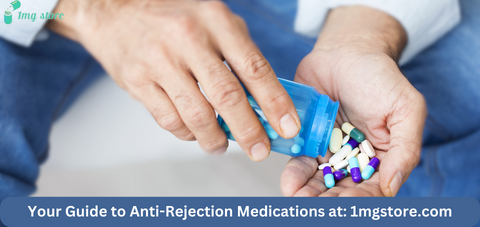
Anti Rejection
-
-
-
Generic: AzathioprineEquivalent Brand: Imuran25 Tablet/s$15.00
-
Generic: Mycophenolate MofetilEquivalent Brand: Cellcept60 Capsules$25.00
-
Generic: Mycophenolate sodiumEquivalent Brand: Cellcept30 Tablet/s$59.00
-
Generic: Mycophenolate MofetilEquivalent Brand: Cellcept30 Capsule/s$77.00
-
Generic: SirolimusEquivalent Brand: Rapamune30 Tablet/s$177.00
-
Generic: SirolimusEquivalent Brand: Rapamune30 Tablet/s$252.40
-
Generic: TacrolimusEquivalent Brand: Protopic1 Tube/s$5.80
-
Generic: TacrolimusEquivalent Brand: Protopic1 Tube$17.50
$439.96 -
Generic: CyclosporineEquivalent Brand: Neoral30 Capsule/s$17.50
Anti-Rejection Medications: Safeguarding Transplanted Hope
Introduction:
In the realm of modern medicine, organ transplantation stands as a beacon of hope for countless individuals grappling with life-threatening conditions. However, the success of these life-saving procedures hinges on an intricate balance—the delicate equilibrium between graft acceptance and rejection. The category of Anti-Rejection medications emerges as a linchpin in maintaining this equilibrium, ensuring the longevity and well-being of transplant recipients. This comprehensive guide delves into the importance of Anti-Rejection medicines, unraveling the complexities of organ transplantation, the immunological challenges it presents, and the pivotal role these medications play in safeguarding transplanted hope.
Understanding Organ Transplantation:
Organ transplantation represents a remarkable triumph of medical science, offering a second chance at life for those with failing organs. Whether it be a heart, kidney, liver, lung, or other vital organs, transplantation involves surgically replacing a diseased or damaged organ with a healthy one from a donor. While this transformative procedure has revolutionized healthcare, it also introduces a unique set of challenges, primarily centered around the body's immune system.
The Immunological Challenge:
The human immune system, a formidable defense mechanism, is programmed to recognize and combat foreign entities, including transplanted organs. When a foreign organ is introduced into the body, the immune system may perceive it as a threat and mount an immune response, leading to rejection. This immunological challenge necessitates a sophisticated approach to balance the preservation of the transplanted organ and the prevention of rejection.
The Role of Anti-Rejection Medications:
Anti-Rejection medications, also known as immunosuppressants, play a pivotal role in managing the immune response and preventing rejection following organ transplantation. These medications work by suppressing the activity of the immune system, curbing its ability to attack and reject the transplanted organ. The importance of Anti-Rejection medicines can be elucidated through several key facets:
Preventing Acute Rejection:
Acute rejection is an immediate and intense immune response against the transplanted organ. Anti-Rejection medications act as a shield, suppressing this initial immune attack and allowing the transplanted organ to integrate and function within the recipient's body.
Minimizing Chronic Rejection:
Chronic rejection is a long-term process characterized by gradual damage to the transplanted organ. Anti-Rejection medications, when taken consistently, help minimize the risk of chronic rejection, extending the lifespan and functionality of the transplanted organ.
Individualized Treatment Plans:
The choice and dosage of Anti-Rejection medications are tailored to the individual recipient, considering factors such as the type of organ transplanted, the recipient's overall health, and potential side effects. This personalized approach optimizes the effectiveness of the treatment while minimizing adverse reactions.
Balancing Immunosuppression:
Achieving the delicate balance between preventing rejection and maintaining a functional immune system is paramount. Anti-Rejection medications are carefully titrated to achieve this balance, allowing recipients to have sufficient immunity to ward off infections while preventing rejection.
Enhancing Transplant Success Rates:
The widespread use of Anti-Rejection medications has significantly contributed to the success rates of organ transplantation. These medications have transformed what was once considered a high-risk procedure into a routine and often life-changing intervention for countless individuals.
Improving Quality of Life:
The effectiveness of Anti-Rejection medications translates into an improved quality of life for transplant recipients. By preventing rejection and allowing the transplanted organ to function optimally, these medications enable individuals to lead fuller, healthier lives.
ddressing Immune Sensitization:
Some recipients may have pre-existing antibodies that can lead to a heightened immune response. Anti-Rejection medications are vital in addressing immune sensitization, mitigating the risk of rejection in individuals with these unique immunological challenges.
Managing Side Effects and Adverse Reactions:
While Anti-Rejection medications are essential for transplant success, they may come with side effects. Monitoring and managing these side effects, such as increased susceptibility to infections or potential effects on kidney function, are integral aspects of post-transplant care.
Conclusion:
In conclusion, the importance of Anti-Rejection medications in the landscape of organ transplantation cannot be overstated. These medications represent a cornerstone in overcoming the immunological challenges associated with transplant procedures, ensuring the success and sustainability of this life-saving intervention. As we celebrate the advancements in medical science that enable organ transplantation, the role of Anti-Rejection medicines stands as a testament to the relentless pursuit of improving and extending lives through transformative healthcare practices.


